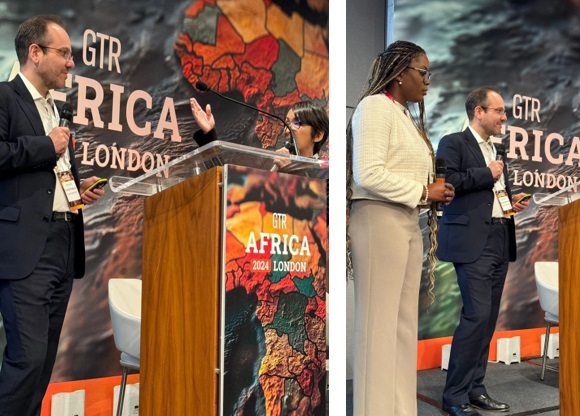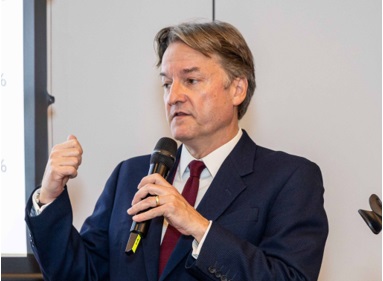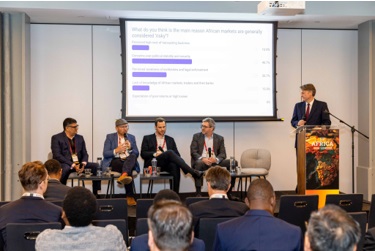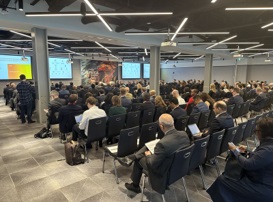-
 ITFA represents the rights and interests of banks, financial institutions and service providers involved in trade risk and asset origination and distribution.Our Mission
ITFA represents the rights and interests of banks, financial institutions and service providers involved in trade risk and asset origination and distribution.Our Mission
Written by Tedd George, ARC Secretariat, December 2024
On November 14th several members of ITFA’s African Regional Committee (ARC) took part in GTR Africa 2024 London, the UK’s leading event on trade finance in Africa. The underlying theme of this year’s discussions was Africa’s trade finance gap and efforts by the global trade finance community to close it.
This was the ideal opportunity to promote the work of the Trade Finance Conference of Parties (TF COP), which was held at the IFC’s headquarters in Washington DC on October 28th. In the morning session there was a presentation by ITFA Board and ARC member, Duarte Pedreira, IFC Global Head of Trade Finance, Makiko Toyoda, and ARC Working Group Lead, Ahanna Anaba, outlining the ambitions of TF COP in the Washington Declaration. These include a bold pledge to halve the global trade finance gap by 2030, to eliminate it completely by 2040, and to lobby the UN to recognise the trade finance gap as a critical barrier to achieving the Sustainable Development Goals (SDGs). As a first step, TF COP’s sponsors plan to create the TF COP Task Force which will drive forward the agenda, starting with the creation of a First Loss Fund for trade finance, backed by the IFC.

Ahanna also showcased the work of the ARC Working Group which is rolling out innovative financial products, standardised documentation and guidance to the market in order to close the trade finance gap. This work was picked up on later in the day by ARC Chair, George Wilson, who spoke on a panel discussing the working capital needs for African SMEs, noting the efforts of the ARC’s members to roll out ‘oven-ready’ financing solutions to the African market.

In tandem with these discussions, ARC
Secretariat, Dr Tedd George, chaired Stream B of the conference, moderating two
panel discussions. The first explored how to get liquidity to Africa’s SME soft
commodity exporters and build supply chain resilience, and involved a
cross-section of the trade finance value chain: a DFI (Pierre
Ligneul-deVilleneuve
from the IFC), one of the leading trading houses (Bharat
Gupta from
Olam Agri), an African grain trader (Nico
Hamman CA (SA) from
Rand Agri) and a fintech (Charles Owen from Red Sky).
The panel discussed why, to use an oft-quoted phrase, ‘Africa can seem scary from afar, but when you get there it’s far from scary’. The problem is that few banks take actual risk on African markets, so they don’t understand the market dynamics or have CBRs there. As Nico noted, Africa is full of risky markets, so it all comes down to the reputation and reliability of the clients you finance and your understanding of the political, FX and logistics risks. Each of the panellists offered their solutions for getting liquidity to where it’s needed in the supply chain. Charles spoke about invoice financing (enabled by Red Sky’s tech platform) that tracks containers through the supply chain, allowing the early release of funds to SME exporters, and the automation of back-office operations which can speed up confirmations from one day to just a few minutes. Nico spoke about the virtual farmer initiative which uses crop tracking to enable input financing, while Pierre described how the IFC’s SCF programme has been refocused towards getting trade finance to non-investment grade, non-LC, non-documentary credit lending (i.e. SME traders).

The second panel moderated by Tedd focused on a region often overlooked on the African continent: North Africa. This panel drew on a range of expertise on the region, including an international bank (Amine Mouffok from BACB), a local bank (Aden Nguyen from NBF), an ECA (Ime Ekong from EDC) and an insurer (Carl Ellerington from Howden Group).
Amine noted that Egypt is the ‘elephant in the room’, dominating discussion about North Africa to the detriment of countries like Morocco which are rising in importance as trade partners for Southern Europe (see our article on the recent ARC-SERC webinar). Carl pointed out that insurance is a partnership product and the market broadly tracks key clients’ activities in the region. This mean insurance appetite gathers around highly strategic trade flows, with consistent demand for strategic commodities (particularly oil) in the oil producing territories (Egypt, Libya and Algeria). Ime discussed the strong Francophone ties between North Africa & France, as well as between Quebec and Morocco/Algeria, while Aden noted the importance of trade & investment flows between Egypt and the Gulf States. All the panellists felt that Egypt and Morocco are the most open to trade and investment, underlining the importance of having stable governments and reliable legal investment regimes.

Look out for the ARC’s involvement in GTR’s Africa conferences next year, which will start with GTR Africa 2025 in Cape Town in March.
Privacy Policy | Cookie Policy
Designed and produced by dna.studio